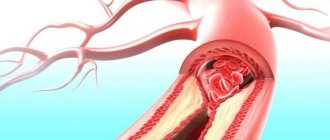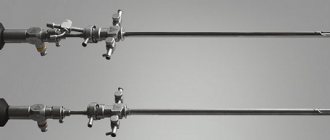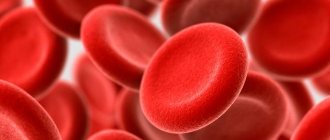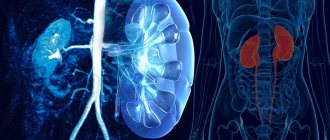Normal hemoglobin level during pregnancy
information Normal hemoglobin levels in pregnant women are 110-140 g/l.
In the second trimester (on average from the 20th week of pregnancy), blood volume begins to increase due to the development of the placental circulation. The blood becomes thinner, the number of red blood cells decreases, and accordingly the hemoglobin level decreases. This condition is physiological. If hemoglobin begins to decrease before 20 weeks or falls below acceptable values, then we can talk about the development of anemia.
Why is elevated hemoglobin dangerous?
Pregnancy is a responsible time for a woman, and increased hemoglobin can pose a danger to her health. With a persistent increase in the iron level in the blood, poor circulation in the body is observed due to increased viscosity. As a result, an insufficient amount of oxygen reaches the fetus, which, in turn, can cause negative consequences:
- the density of the lymph delays the delivery of nutrients to the fetus;
- there is a delay in intrauterine development of the child;
- hypoxia may occur in the last trimester;
- miscarriage may occur;
- You should be wary of premature birth.
Glycated hemoglobin is a biochemical indicator that indicates the average level of sugar in the blood over the past 3-4 months. Glycohemoglobin shows the reaction of glucose molecules with hemoglobin particles. The higher the glycated hemoglobin level, the higher the glycemia over the past 3-4 months, and therefore the higher the risk of complications.
A pregnant woman should take this test every one and a half months. The norm of glycohemoglobin is different for all women. It depends, first of all, on age indicators. If a woman carries a child until she is 30 years old, her normal rate will be 6.5%. For more patients from 30 to 40 years old, it increases to 7.0%. An indicator of 7.5% will also be normal for women who decide to have a child at the age of 40+.
Note! The analysis is important in order to know how the baby is developing in the womb, whether everything is going correctly and fully. An increase or decrease affects the health of a woman and her unborn child.
If glycohemoglobin is higher than normal, this indicates that the baby is overweight and the birth will most likely be difficult.
Taking a test to determine hemoglobin
Determination of hemoglobin is one of the components of a general blood test
. The test is taken by pricking the ring finger.
Rules for taking a general blood test
:
- It is best to donate blood in the morning on an empty stomach. In emergency cases, the analysis is taken at any time of the day, no earlier than an hour after eating;
- It is advisable to exclude fatty fried foods and alcohol from your diet one day before;
- Do not smoke an hour before the test (hemoglobin levels will be increased);
- Avoid physical and mental stress 10-15 minutes before taking blood;
- Warn the laboratory technician about taking any medications;
- If possible, get tested in one laboratory.
Prevention of the pathological condition, relief of the main symptoms
If a woman is planning a pregnancy, high hemoglobin can be adjusted even before the pregnancy begins for the safety of her health and the health of the unborn child. To this end, it is necessary to review your diet and follow other expert advice. To prevent digestive disorders, you should exercise and often walk in the fresh air.
The following products must be present in the diet:
- Red meat.
- Sea fish.
- Whole grain bread and cereals.
- Legumes.
- Starchy vegetables such as pumpkin, potatoes, carrots.
- Dried fruits and nuts.
- Apples, persimmons, peaches.
For proper absorption of iron by the body, you need to focus on consuming proteins and not eating such foods with milk or cottage cheese. In addition, you should not wash down your food with coffee or strong tea.
If you adhere to these simple rules and constantly undergo examination by a doctor, then any woman will be able to bear a healthy baby and overcome any ailments. The main thing is to be attentive to your own health.
Rate this article:
(votes: 1 , average: 5.00 out of 5)
Loading...
Related posts:
- Low hemoglobin in a child, causes and signs. Foods that increase hemoglobin in children
- Why can high hemoglobin in a man be very dangerous for health?
- Why high hemoglobin is formed in women, and how it affects their health
- What is hemoglobin characterized in children, its distinctive features
- What are the causes of low hemoglobin in children and how does the pathology manifest?
- Characteristics and causes of low hemoglobin in men. What is the treatment?
Causes of anemia during pregnancy
The main factors that increase the risk of anemia during pregnancy
:
- Poor nutrition with insufficient intake of vitamins and microelements from food;
- Constant exposure to toxic substances (living in an environmentally unfavorable area, working in hazardous industries);
- Chronic infectious diseases;
- Diseases of the endocrine, urinary and other systems;
- Autoimmune diseases;
- Multiple pregnancy;
- Bleeding during pregnancy;
- Frequent childbirth.
Symptoms and treatment
Blood with increased hemoglobin becomes more viscous, making its circulation through the vessels and capillaries more difficult. Because of this, the fetus may not receive the necessary nutrients and oxygen, and its development will suffer.
An increase in Hb can lead to the formation of blood clots. Therefore, if tests show several times in a row that your hemoglobin level is higher than normal, then it’s time to take measures to reduce it.
Symptoms of increased hemoglobin during pregnancy are:
- sleep disturbance;
- emotional instability;
- mood swings;
- changes in blood pressure;
- dizziness, weakness;
- redness of the skin;
- increased dryness of the skin and mucous membranes.
Drug treatment for elevated hemoglobin is most often not required, especially since a woman cannot take most medications during pregnancy.
Usually, the doctor advises pregnant women to drink more fluids, walk in clean air, take vitamins and folic acid - these measures are enough to normalize hemoglobin levels to normal numbers.
Sometimes your doctor prescribes blood thinning medications:
- anticoagulants - slow down fibrin synthesis and prevent the formation of blood clots;
- antiplatelet agents - prevent platelets from sticking together and forming blood clots.
The most famous antiplatelet drug is Aspirin. The drug is prescribed during pregnancy to women with varicose veins and a tendency to form blood clots, especially if they have high hemoglobin.
READ MID level in blood test
The basic rule when prescribing aspirin during pregnancy is the correct dosage - it should be minimal (no more than 100 mg per day).
The tablets should not be taken on an empty stomach; they should be swallowed after meals and washed down with plenty of water.
In the first and third trimester of pregnancy, Aspirin should be used with extreme caution, as it can lead to negative consequences for the health of the unborn baby.
In the first trimester, the baby's organs are formed, and Aspirin can disrupt this process. In recent months, preparations for childbirth are underway, and blood thinning sometimes leads to postpartum hemorrhage.
It is safest to take Aspirin and similar drugs in the second trimester of pregnancy.
In addition to Aspirin, expectant mothers are prescribed Fraxiparin and Curantil to thin the blood. To prevent hemoglobin from increasing during pregnancy, you can take preventive measures: stick to proper nutrition, walk outside, and drink plenty of fluids.
Prevention will help if the situation is not advanced, otherwise a course of treatment cannot be avoided.
Symptoms of low hemoglobin
- Weakness, increased fatigue;
- Pale skin;
- Deterioration of hair and nails;
- Perverted taste (desire for inedible foods), addiction to certain smells;
- “Sticks” in the corners of the mouth;
- Periodic involuntary urination due to the development of sphincter weakness;
- Impaired functioning of the cardiovascular system: shortness of breath, rapid heartbeat, tendency to edema;
- Signs of gastritis.
Anemia and its types
- Easy Art. (when hemoglobin is from 110 to 91 g/l, red blood cells are from 3.6 to 3.2 * 10 to the 12th power g/l);
- Average st. (hemoglobin - from 90 to 71 g/l, red blood cells - from 3.2 to 3.0 * 10 to the 12th power g/l);
- Heavy Art. (hemoglobin below 70 g/l, red blood cells below 3.0 * 10 to the 12th power g/l).
The causes of anemia are always varied:
- Of course, the main reason is the pregnant woman’s diet, the lack of vitamins and microelements in food.
- Diseases of the urinary and cardiovascular systems.
- Frequent presence of toxic elements in the body.
- Environmental conditions in the field of activity or the environment.
- Multiple pregnancy with twins, triplets, etc.
- Large blood loss during pregnancy.
- Chronic infectious diseases;
- Diseases associated with a malfunction of the immune system.
- Frequent pregnancy and childbirth.
- Insufficient intake of vitamins B12, zinc, folic acid.
- Treatment with antibiotics.
- Toxicosis.
Signs of anemia (low hemoglobin):
- Lethargy, drowsiness, dizziness and fatigue.
- Poor condition of nails and hair.
- Pale skin color.
- Irritability, bad mood.
- Sleep disturbance.
- Frequent colds.
- Cravings for inedible foods and specific flavors.
- “Hagnails” in the corners of the lips;
- Due to the weakening of the sphincter, involuntary, voluntary urination.
- Disruptions in the cardiovascular system.
This is manifested by swelling, shortness of breath, and rapid heartbeat.
Consequences of anemia
Since hemoglobin is involved in such important processes as oxygen exchange in tissues, when it is insufficient, these metabolic processes slow down. Low levels of it in the mother affect the future health of the child, in particular, his immunity, which threatens regular colds and slow development of the baby.
With anemia in a pregnant woman, the baby is born with low weight and has a harder time adapting to the new living environment. Low hemoglobin sometimes causes some complications during childbirth. For example, prolonged bleeding. Also, with anemia, it is more difficult for a woman to recover after childbirth. Due to easy fatigue, it is difficult for her to care for her child.
You can increase hemoglobin either with the help of a varied diet or with the help of iron supplements. But we must understand that food can only maintain a normal level, and its deficiency can only be restored with special iron preparations. Iron supplements should only be prescribed by a doctor under whose supervision you are. Here are some tips to help restore your hemoglobin level to normal or maintain it at the desired level:
- Include foods high in iron in your diet.
- Avoid vegetarianism.
- Consume large amounts of protein (red meat, organ meats, fish);
- Reduce fat intake to 70 g per day;
- Eat a variety of cereals, vegetables and fruits, as they contain carbohydrates necessary for the body.
Here is a list of some foods high in iron:
- Beef and pork by-products;
- Caviar;
- Veal, turkey;
- Eggs;
- Fruits;
- Berries;
- Juices: carrot, beetroot, pomegranate;
- Nuts and dried fruits, mushrooms;
- Whole grain bread, cereals;
- Red meat;
- Cocoa, dark chocolate;
- Honey;
- Legumes: buckwheat, beans;
- Vegetables and greens: any cabbage, spinach, wheat sprouts, etc.
All these products contain large amounts of iron
It is also important to know that iron is well absorbed only at the same time as vitamin C, so it is also recommended to include this vitamin and foods rich in it in your diet. As we see, products can be very diverse
But it is also important to have a sense of proportion so as not to cause allergies with certain foods. Walking in the fresh air and light physical activity, such as swimming, help a lot.
Iron tablets are almost always prescribed if a woman’s hemoglobin is below normal. The exception is emergency cases when an urgent transfusion of red blood cells or intravenous administration of drugs is required.
Iron supplements
At the present stage of treatment of anemia, various means are used: medications, natural nutritional supplements, various home treatments.
- Posthemorrhagic anemia - occurs when blood is lost in large volumes.
- Anemia of pregnancy is a separate type in which pregnant women experience iron deficiency in the body.
- B12-deficiency anemia - develops due to a lack of vitamin B12, occurs with infections, with insufficient absorption in the intestines, with a lack of vitamin in food, in older people.
- Hemolytic anemia - develops when red blood cells are destroyed, occurs due to genetic pathologies, exposure to cold, poisoning with heavy metals, poisons.
- Iron deficiency anemia – a decrease in the level of iron in the blood occurs as a result of pregnancy, chronic bleeding (uterine bleeding, duodenal ulcer, stomach ulcer, hemorrhoids).
Diagnosis of anemia in pregnant women
Diagnosis of anemia during pregnancy is based on clinical signs and blood test data
:
- Decrease in the number of red blood cells (less than 3.6*10 to 12 degrees/l);
- Decreased hemoglobin level (less than 110 g/l);
- Hypochromia (change in the color of red blood cells to pale pink);
- Change in color index (less than 0.8);
- Decrease in the average hemoglobin content in one red blood cell (less than 27 pkg);
- Decreased serum ferritin concentration (less than 10 ng/ml);
- Changes in the size and shape of red blood cells;
- There may be an increase in platelet levels and a decrease in leukocytes to the lower limit of normal;
- Increase in ESR;
- Increased reticulocyte levels.
Why does hemoglobin increase?
The main reasons affecting hemoglobin levels include:
- Hereditary predisposition to the disease.
- Lack of vitamins B9 or folic acid and B12. Sometimes they are not absorbed by the digestive system.
- Kidney diseases in which large amounts of protein are produced.
- Diseases of the gastrointestinal tract, including intestinal obstruction.
- Hemoglobinemia or increased plasma pigment levels.
- Bad habits.
The disease is manifested by drowsiness, blurred vision, fatigue, appetite disturbance, pale skin color and shortness of breath.
How to increase hemoglobin during pregnancy
Additionally, treatment of anemia during pregnancy includes following a special diet and taking iron supplements to increase hemoglobin levels.
Principles of dietary nutrition
:
- Food with increased amounts of vitamins;
- Vegetarianism is strictly excluded;
- Increase in protein products (meat products, offal, fish, fatty cottage cheese);
- Reducing the amount of fat to 80 grams per day (excluding fatty fish, lard, lamb);
- Obtaining carbohydrates from cereals, vegetables and fruits.
Products with high iron content
:
- Pork and veal liver, heart;
- Veal, turkey;
- Egg yolk;
- Apricots, almonds, apples, spinach;
- Stale bread;
- Cocoa.
Drug treatment
Taking iron supplements should be long-term
, because Normalization of blood test values occurs only after 6-8 weeks.
In most cases, drugs are taken in the form of tablets; parenteral administration is prescribed according to strict indications
:
- Intolerance to oral iron supplements;
- Peptic ulcer of the stomach and duodenum;
- Severe forms of anemia;
- Impaired absorption of iron when taken in tablet form.
Taking iron with additional components that help its absorption more efficiently (ascorbic acid, folic acid) is of great importance.
To date, a number of combined preparations have been developed, including iron and the necessary components (sorbifer, totema, maltofer, ferrum lek, etc.).
Self-medication is strictly prohibited
, the required drug and the required dosage are prescribed only by the attending doctor with regular monitoring of a general blood test.
In severe forms of anemia, when there is a threat to the life of the mother and child, anemia is treated with blood transfusion (transfusion of donor red blood cells).
Diagnostics
As a rule, a pregnant woman does not feel at all that her level of iron-containing protein is increased. The deviation is detected by chance after a regular blood test or during a sudden deterioration in health. During the next visit to the gynecologist, the specialist examines the woman to exclude the possibility of developing varicose veins.
A blood test is done to determine hemoglobin protein levels. In addition to the general study, a coagulogram is performed, which determines the level of coagulation. During the general examination, the content of hemoglobin protein, ESR indicators, the level of erythrocytes and leukocytes are noted. In a healthy woman, iron-containing protein ranges from 120 to 140 g/l. If the increase in level does not exceed 10%, they speak of physiological thickening. When hemoglobin protein rises above 160 g/l, treatment is necessary.
Important! Additionally, a general laboratory examination of urine analysis is carried out. This is necessary to eliminate the risk of kidney infection. If a pronounced density of blood flow is detected, instrumental diagnostics are performed. It is needed to determine how severely the venous and cardiac circulation is impaired.
To determine the speed of blood flow in the internal organs, some patients undergo duplex ultrasound examination. Exceeding the standard value indicates an increased content of iron-binding protein. If necessary, additional venography is performed. This study shows the condition of the veins and allows you to evaluate prognoses. For phlebography, contrast components are injected into the vessels.
Complications of anemia during pregnancy
Important Anemia can lead to a number of complications, both during pregnancy and during childbirth, so this pathological condition requires immediate and complete treatment.
Possible complications of anemia in pregnant women
:
- Premature termination of pregnancy;
- Chronic fetal hypoxia;
- Intrauterine growth retardation;
- Hypoplasia of the chorion and placenta;
- Fetoplacental insufficiency;
- Placenta previa;
- Premature abruption of a normally located placenta;
- Preeclampsia;
- Weakness of labor;
- Hypotonic bleeding during childbirth and the postpartum period;
- Asphyxia of the newborn;
- Hypogalactia (decreased milk production).
Predictions and prevention
Since a high level of iron-containing protein in pregnant women is a concomitant condition, all complications develop as a consequence of the underlying disease. Therefore, prevention of exceeding the permissible norm of the hemoglobin indicator is nonspecific. It is enough for a woman to monitor her well-being, switch to proper nutrition, give up bad habits and be physically active. Following these simple recommendations greatly reduces the likelihood of worsening the pathology.
With elevated levels of iron-containing protein, the prognosis is usually favorable. Drug therapy is not required if there are no obvious symptoms. To bring the hemoglobin indicator back to normal, it is enough to eliminate blood viscosity and the tendency to form blood clots and rehydrate the body. Treatment consists of following a special diet and using folk remedies.
Pregnant women rarely develop high hemoglobin. Normalizing its level involves following a special diet and adjusting your lifestyle. Drug therapy to correct iron-containing protein in pregnant women is rarely used and only in case of significant excess of the norm.
High hemoglobin during pregnancy
Information There is an opinion that during pregnancy only a decrease in hemoglobin levels is dangerous, but this is not true. Persistent persistence of high hemoglobin can also lead to a number of serious complications.
The main reasons for increased hemoglobin^
- Heredity;
- Accommodation in high mountain areas;
- Increased physical activity;
- Maternal smoking;
- Lack of folic acid;
- Diseases of the cardiovascular and urinary systems;
- Dehydration (often observed with severe toxicosis, accompanied by excessive vomiting);
- Diabetes;
- Hypervitaminosis of B vitamins;
- Intestinal obstruction;
- Oncological diseases.
Clinical picture with elevated hemoglobin
The clinical picture is similar to anemia: the woman is worried about increased weakness, fatigue, and drowsiness. In the presence of chronic diseases, an increased manifestation of their symptoms is characteristic.
Diagnostic measures
Diagnosing high hemoglobin is not difficult and is easily determined by deciphering a general blood test. To identify the exact causes of this pathological condition, the doctor will prescribe a series of examinations for the pregnant woman.
th:
- General urine analysis;
- Blood chemistry;
- Consultations with specialized specialists (therapist, cardiologist, endocrinologist, urologist, oncologist). Further examination is carried out under their supervision.
Complications caused by elevated hemoglobin levels
- Premature termination of pregnancy;
- Fading pregnancy;
- Intrauterine growth retardation;
- Chronic fetal hypoxia;
- Intrauterine death;
- Increased risk of thrombosis in the mother.
All complications are associated with increased blood density and viscosity, resulting in less oxygen and nutrients reaching the fetus.
Treatment for high hemoglobin
- Drink plenty of fluids;
- Following a diet with limited iron-rich foods, animal fats and increased consumption of fish and seafood;
- Taking blood thinning medications (chimes, trental, cardiomagnyl);
- Treatment of concomitant diseases.
Prevention
- Regular monitoring of general blood count (upon registration, 18, 28, 35 weeks);
- Rejection of bad habits;
- Detailed examination during pregnancy planning;
- Timely treatment of chronic diseases.
Principles of treatment for high performance
When thinking about how to lower hemoglobin during pregnancy, it is worth understanding that any deviations in the blood picture are not a disease, but only a symptom, or a reflection of what is happening inside the body. First of all, treatment should include folk remedies, lifestyle changes and correction of the pregnant woman’s diet.
Important! Not all medications are suitable for use during pregnancy. This means that before you start using any medicine, you should consult your doctor.
What to change in your diet
To keep hemoglobin within normal limits, it is important that a pregnant woman drinks enough clean water daily. This will allow the blood to maintain its rheological properties.
It is important to reconsider your meat preferences. If your diet contains a lot of red meat, it should be replaced with white. Red contains many components from which hemoglobin cells are produced. Reducing this product in the diet will reduce its production.
Attention! A serious consequence of high hemoglobin for the fetus can only appear if the mother experiences symptoms of a change in the blood formula. In other cases, no treatment is required.
Medications
There are no medications whose action is aimed at reducing hemoglobin levels. The effect is usually achieved through the use of antispasmodics and vasodilators. In most cases, they are allowed for pregnant women if there are no other contraindications.
Your doctor may recommend a vitamin complex. It is worth considering that products containing iron can only be used by those with low hemoglobin. With increased indicators, you need those complexes that contain a lot of vitamin C.
How to increase hemoglobin
Immediately after signs of a disorder appear, therapy should be started in the early stages. Proper treatment should combine a balanced diet with medications. To normalize hemoglobin, it is important to eliminate the cause of anemia. Treatment with iron alone is ineffective. The accumulation of this component in the body can sometimes cause serious harm. Often, eliminating pathology requires treatment of intestinal diseases that interfere with iron absorption.
To achieve normal hemoglobin levels, you need to follow the following recommendations from specialists:
- At the initial stage, it is better to increase the level of red blood cells in natural ways through proper nutrition with iron-containing foods.
- If the patient's hemoglobin level is below 90 mg/l, doctors prescribe medications and vitamin complexes: Ferrum Lek, Sorbifer, Totem, Tardiferon.
- When the level of iron in the blood decreases below 70 mg/l, injections of special drugs may be prescribed that help to quickly increase its levels.
Products
It will not be possible to achieve a high hemoglobin level using tablets alone. As a rule, the synthesis of special proteins in the blood is achieved by proper nutrition. It is recommended to focus on the following products:
- greenery;
- liver;
- lean meat;
- cereals;
- legumes;
- walnuts;
- dried fruits;
- vegetables - beets, pumpkin, tomatoes, cabbage;
- fruits - apples, peaches, pomegranates, bananas;
- currants;
- cranberries
Iron supplements
Hemoglobin during pregnancy can fall for various reasons. Treatment is prescribed depending on the specific case. Totema is one of the popular remedies in the form of a solution. The drug helps increase the level of hemoglobin in the blood, contains elemental iron, manganese, and copper. Take the solution for anemia and for prevention from 1 to 4 ampoules daily.
Sorbifer Durules is a combination drug against anemia in tablet form. The composition contains iron sulfate and vitamin C, due to which the product is better absorbed. The advantage of the drug is its high bioavailability and gradual release in the intestinal lumen, due to which the tablets do not injure the mucous membrane. The disadvantage of the drug is side effects such as nausea, constipation, diarrhea.
Folk remedies
When thinking about how to increase hemoglobin during pregnancy, it is worth considering home recipes, the effectiveness of which has been proven over several generations. However, before using folk remedies, you should consult your doctor. Popular recipes are presented below:
- Combine chopped walnuts with buckwheat and pour honey. Take 1 spoon every day.
- Mix equal parts of raisins, dried apricots, nuts, add honey. Consume no more than 3 spoons daily.
- Grind prunes, dried apricots, dates, raisins, lemon zest with a blender. Pour liquid honey, consume 3 spoons every day.











